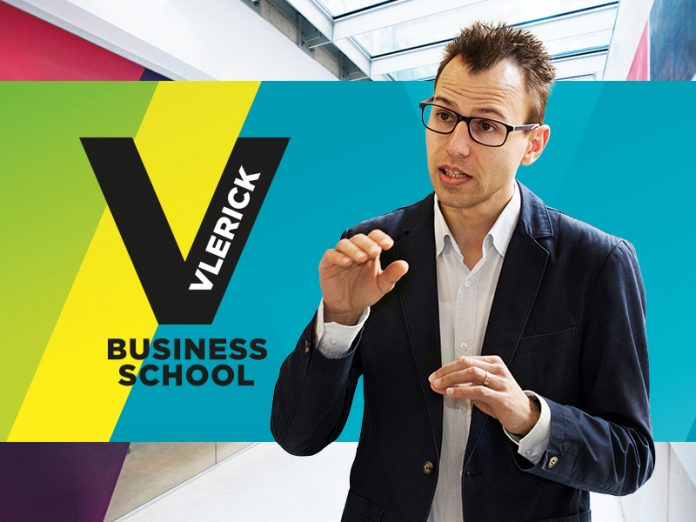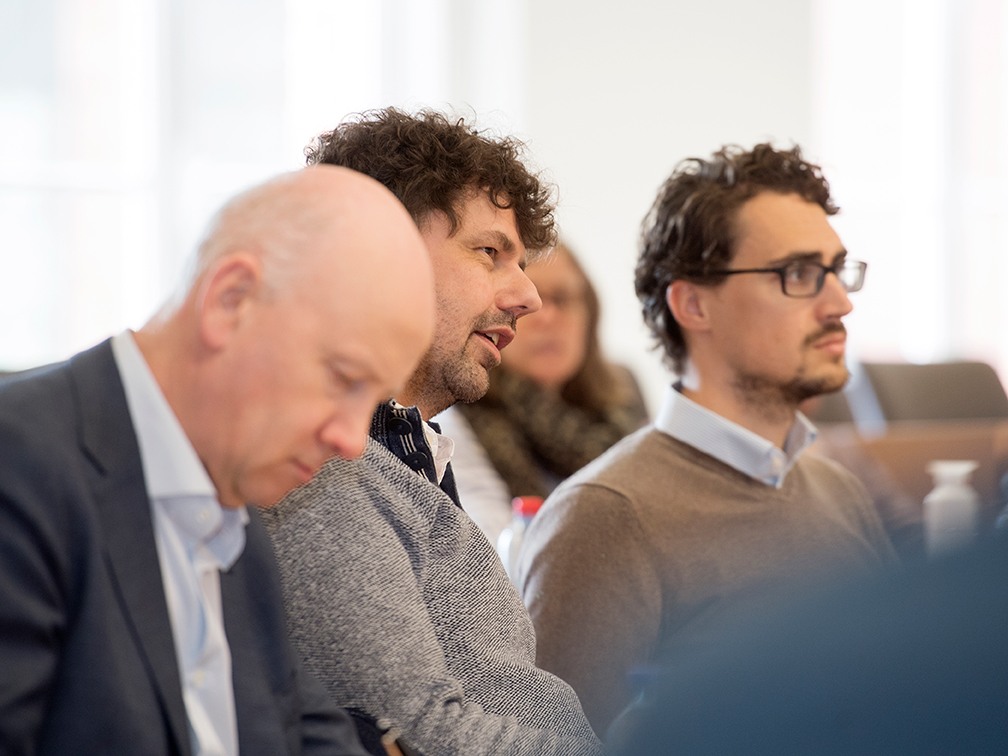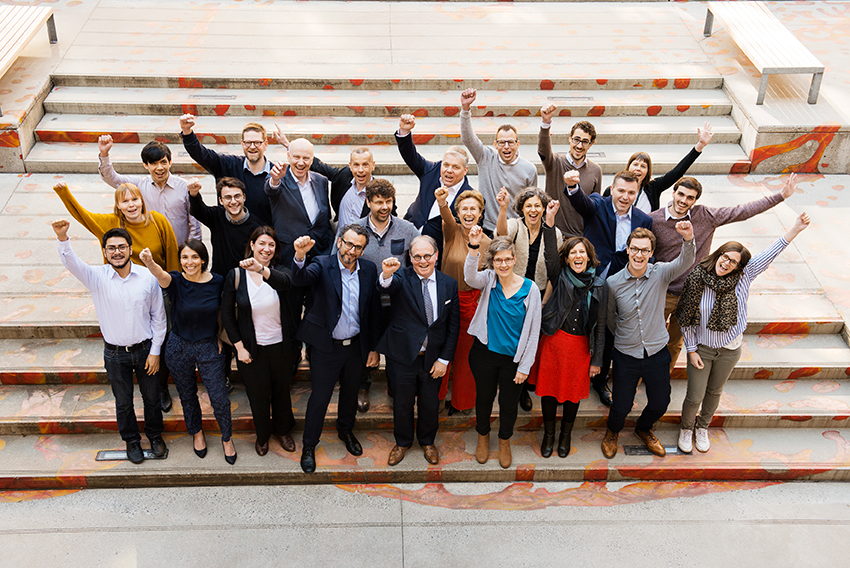Interview with Professor Brecht Cardoen, Academic Director of the DBA programme, Vlerick Business School
Founded in 1953 in one of Europe’s premier education spots, Vlerick Business School in Belgium focuses on knowledge creation through research-based learning structure to produce business leaders that approach business problems in a broader and more scholarly mindset. To further advance the research excellence in the business management field, Vlerick Business School, Ghent University and KU Leuven have launched its DBA programme in Europe last year. In this interview, Professor Brecht Cardoen, PhD, Academic Director of the DBA programme, shared with us the unique features and benefits of pursuing this highest academic degree in business administration.
Good day, Professor Cardoen! Thank you for taking the time to talk to us today. Let’s start this interview by giving us a glimpse of what a day looks like for an academic and business leader like you?
Being part of our career faculty, a typical day mirrors activities at different levels. I could be enjoying an interactive teaching session with our executives or making advancements in one of our research projects on process optimisation and value-based healthcare. In both cases, I have noticed an increasing interest in decision-making supported by quantitative methods, which has created opportunities to innovate and learn. Therefore, a day in my academic life definitely turns into a good day when conversations spark an idea for further research. Listening is a crucial capability here, as there are many challenges, ideas, opportunities that cross paths in the business school. This is also evidenced in our Doctorate in Business Administration (DBA) programme, where candidates show research interests in various functional domains, sectors, or geographical areas. As the Academic Director of the DBA programme, helping our candidates in assessing their fit with the programme and matching them with supervisors are also part of my daily activities.
As the Academic Director of the DBA programme, can you tell us what sets this programme apart from other advanced management degrees?
It is important to understand that the DBA is a programme in which research is the key cornerstone and thus emphasis is put on research methods and their application. This is very different from MBA programmes, which have the ultimate goal to make you a better manager, which is not necessarily the same as becoming a great scholar. Scholarship is about the disciplined search for knowledge that remains reliable independent of the passion, desire or material interest of the discoverer. It requires developing a wide variety of skills, including creativity, critical thinking, writing skills, community building skills, persistence and resilience. The difference in mindset makes a researcher’s approach to a challenging question very different from a manager’s approach, probably leading to many more questions. So when thinking about the DBA, the main focus is on in-depth knowledge creation instead of knowledge dissemination. At Vlerick Business School, we talk about ‘bringing action to knowledge’, leveraging the experience of our candidates. And, when talking about degrees, a successful completion of our DBA programme is awarded by a joint PhD degree from the university partners KU Leuven and Ghent University.
You also hold teaching assignments at the Executive MBA, Full-time MBA, and graduate level at Vlerick and KU Leuven. How do you think the DBA programme could advance and leverage its participants’ business knowledge and expertise should they pursue a Doctorate in Business Administration? What are the significant edges one could obtain?
DBA participants excel in finding relevance in the research questions they want to tackle. Building upon so many years of experiences, there is a solid base that helps them to point to a relationship or hypothesis that is worth investigating. Next, a DBA participant also typically has a unique access to data, which is often seen as a challenge by scholars. By making use of their network or company resources, they create a head start and open up a range of opportunities. However, not all that glitters is gold, and I believe a DBA participant could also often be uncertain about some aspects of doing research. In this case, our programme helps them to install rigour next to relevance, i.e. educating them how to adequately design and execute research, building that analytical mindset as mentioned. We enable our participants to conceptualise compared to the daily firefighting their jobs often bring. In a way, they learn to slow down again and step away from the daily hassle their executive function often entails.
Vlerick Business School has joined forces with other Belgium’s top ranked universities namely Ghent University and KU Leuven in creating the DBA programme. Can you tell us how this partnership benefits the participants and how the three institutions collaborate?
Indeed, our DBA is a partnership of three strong institutions, which allows playing on the strengths of each partner. Whereas the business school enjoys a triple accreditation, is pragmatic and familiar in working with executives, the universities bring in an exceptionally strong research culture and performance. Every DBA candidate gets at least two supervisors whose expertise is tailored to the real need of the participant. Also, it means we make complementary teams of supervisors, as hardly ever all necessary expertise to support a participant is bundled in a single person. The partnership provides a large faculty base to make such supervisory teams. The collaboration between the three is however not restricted to the supervision of the participants, but stretches also to the course teaching, access to libraries, and so forth. Finally, joining forces enables the award of a joint PhD degree, giving stronger branding and value for the participant.
Your research is centred on healthcare process management and optimisation with a particular interest in hospitals. You also head the healthcare provider initiatives of Vlerick’s Healthcare Management Centre such as MINOZ, a research network of Belgian hospitals searching for solutions to operational challenges. How does your background help you manage and cultivate a unique design for the DBA programme?
My research in healthcare is multidisciplinary and combines many strands. Let’s think for instance, about value-based healthcare. Porter defines value in healthcare as achieving the best outcomes at the lowest cost1. One way of looking at this equation implies that more value is obtained when the same outcome is delivered at lower cost. Having thus a detailed understanding about costing mechanisms is essential to think further on process improvements, and therefore it makes sense to team up with an expert in the field of cost and management accounting. Value-based healthcare is furthermore not only a topic that triggers the interests of academics, but also the interest of industry and healthcare providers. In other words, with my research I connect and combine different angles. Making these bridges also enables the creation of spillovers in research: why would a good research design not lead to both an academic paper and insights that fit the interests of our business community and society? Furthermore, being an active researcher also makes me aware of the potential pitfalls and difficulties, which I try to translate together with my colleagues into the DBA programme.
How do you make sure the results of participating in your programme will be worthwhile for participants and their organisations in terms of knowledge acquisition, career advancement, long-term profitability for business, and other measures of ROI for a business education degree?
Now we’re talking about impact, which has different dimensions. The DBA creates impact towards the individual, the company, but also society. We embed an elective part and also specific skills sessions that together ensure the personal growth of our participants. The electives can be directed towards academic, business or teaching oriented activities. Skills sessions are organised around topics such as but not limited to presentations for different audiences (how to adapt your message according to the recipient), or career management (thinking about opportunities the PhD degree might create). We actively stimulate our participants to think about impact, and also require them to write an impact plan. For companies, the major impact follows from developing an in-house expert, leading to innovation and discovery. We often see that research questions can be pinned into the business context of a company, which creates a clear win for both company and candidate. Also, the DBA can be seen as a validation method for ideas or insights one might have, and thus finding evidence to confirm or reject current thoughts. Listening to our participants and their motivations, I’m not sure that ROI of a DBA should be defined in terms of profitability or financial gain, which is often the case when talking about management degrees and measuring their impact. Well, I guess we can have an entire talk discussing about impact and doing research that matters. It is no coincidence that we chose the latter topic as central theme of this year’s DBA conference, given the importance of this debate for research institutes in general but certainly also for doctoral education.
As you have just launched the programme last year, what should the present and future participants look forward to in terms of the academic and extracurricular experience they may obtain? What are your significant plans and/or initiatives to strengthen the programme in the coming years?
It is important to keep in mind that pursuing a DBA is in essence a very individual trajectory. In a way, the success and progress of your research is determined by your efforts and capabilities, which by no means imply that you are alone in your journey. Besides the obvious support of your supervisors, building a community of peers is of crucial importance. We especially would like to strengthen this community of peers who all face a similar endeavour and are in need of sharing and caring when it comes to their doctoral journey. This is fostered by different activities during the course weeks. In the future, we want to build on our strengths. Naturally, growing our international DBA community is a top priority in the upcoming years, including leveraging our doctoral school and extending some key activities such as our DBA conference.
What’s the most challenging when addressing the needs of your participants? How do you meet their expectations and have them better prepared upon returning to their respective workplaces?
First, I already pointed out that seeing relevance of research is a strong capability of our DBA participants, leading to a clear management question. However, a management question is not yet an academic research question, and this translation appears to be hard at the start since the academic world often is yet to be discovered. During our application process, we first screen for eligibility, and in a second stage we actively help our participants in drafting a first research idea. Here, a crucial role is attributed to potential supervisors who will discuss and guide the candidate even before admission. This implies that, when admitted to our programme, the participants already have been assigned supervisors, have been in touch with those supervisors, and have a research idea that connects to an ongoing academic debate, all starting from their initial idea. Second, next to the research question, we see challenges at the level of rigour, as often methodological skills and knowledge still need to be developed, which is in the programme addressed by the coursework. Third, finding the work-research balance is not straightforward as executives have busy calendars. Therefore, providing a smoothened process – allowing for some flexibility – is important not to lose any valuable time. We also invite our candidates to communicate well and in advance about their engagement in the DBA, both professionally and with relatives. Finally, as for any degrees, there are deliverables and deadlines, turning the professional somehow into a student again. This might need some adaptation, but our DBA team is ready to provide the necessary guidance here and regular progress reporting helps in the communication.
As the world and businesses rapidly evolve, leadership becomes more challenging. What do you think are the important qualities a business leader must have in order to drive business functions successfully into the future?
This is a question we’ve been thinking about as a business school, especially since the pace of change is high, and I’m confident our point of view also holds for the DBA. First important quality is that you have to live your dream. You need to understand the context today, but have a goal for tomorrow and dare to take the first step. Second, be a student, always. A leader should be open to lifelong learning and challenge the status quo when it comes to current models and methods. Third, leaders leap and succeed in making a transformation and creating impact. I think this fits the entrepreneurial spirit of Vlerick Business School, and thus also translates into the DBA programme. Live, Learn, Leap.
And subsequently, how do you make sure your programme has a lasting impact on the professional development of your participants?
We create that lasting impact mainly by changing and broadening their mindset to become a scholar for life. It’s a different way of looking at problems, a habit or mindset you never forget. Furthermore, impact is created where the (unmet) needs are the highest and the offer is up to expectations. Therefore, explicitly screening for relevance is important, just like tailoring the programme with electives and the right amount of flexibility. Don’t forget that participants can build upon vast experience, a fundament that offers the right framing to internalise and connect new learnings.
Pursuing a doctorate is a demanding journey. Can you share with our readers and prospective participants of the DBA programme how you make sure that you maintain a healthy lifestyle, both in your professional and personal life? What are your favourite routines?
Not sure whether I’m providing a best practice here…I tend to think about healthy lifestyle in two dimensions: mentally and physically. It is important to clear the mind from time to time: being physically present not necessarily means you are also mentally present. I still remember from my own PhD studies that leaving problems at work is not so easy. At that time I was programming quite intensely, and nothing worse than knowing there’s a bug in the code just when the packed weekend was about to start. Physically, I make sure to give sufficient attention to sleeping as it also helps balance professional and personal life. Area for improvement? I would like to drink less coffee, find a more healthy way of commuting, provide sufficient time and attention to having a diversified lunch; a bit more of sports would be welcome too. I guess too many wishes for a single year, no?
Lastly, what does success mean to you? Any other message you wish to share with our readers?
Success points to reaching the goals you have defined within a defined set of constraints. One typically defines multiple goals on sometimes very different levels that simultaneously need to be aimed for. So in this sense, I find it difficult to give a straightforward answer to this question, as there are so many things I actually want. Supporting people in reaching their successes also feels like a success for me personally, regardless of whether it is in pursuing a DBA or the broader educational field. I truly hope that whatever activity you do, you do it with joy, since I’m a strong believer that joy and success ideally go hand in hand.
Thank you very much, Professor Cardoen! It’s a pleasure speaking with you.
 Brecht Cardoen is the Academic Director of the DBA Programme. He is Associate Professor in Technology and Operations Management at Vlerick Business School and Associate Professor at the Faculty of Business and Economics of KU Leuven (Belgium). His research is centred around healthcare process management and optimisation with a particular interest in hospitals.
Brecht Cardoen is the Academic Director of the DBA Programme. He is Associate Professor in Technology and Operations Management at Vlerick Business School and Associate Professor at the Faculty of Business and Economics of KU Leuven (Belgium). His research is centred around healthcare process management and optimisation with a particular interest in hospitals.








































